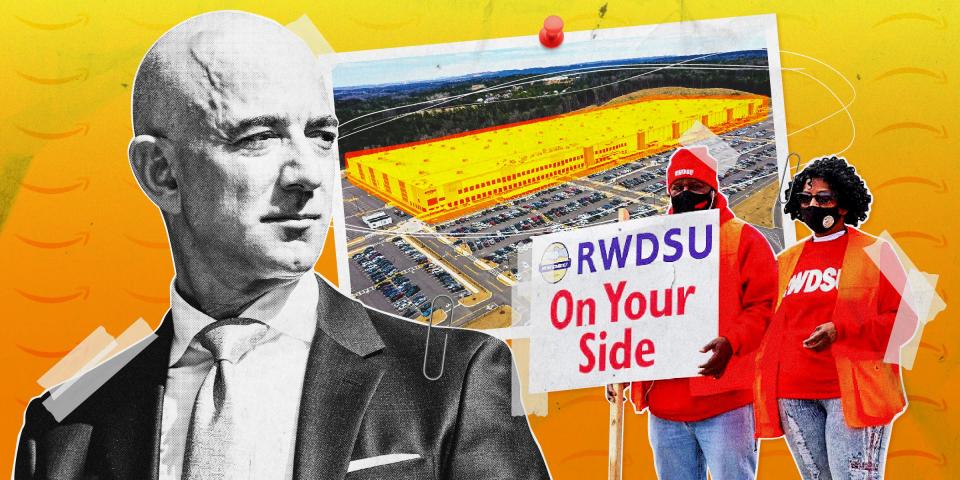Amazon's victory against a union drive in Alabama proved workers want better workplaces, but America's labor laws are too broken to help them get that, experts say

Amazon has the votes to defeat a historic union vote by workers in Bessemer, Alabama.
But experts say companies' battles with workers, regulators, and politicians are far from over.
They told Insider that Amazon's anti-union push proved companies have too much power over workers.
After one of the most high-profile union - and anti-union - campaigns in recent history, Amazon employees in Bessemer, Alabama, voted overwhelmingly against unionizing, with the National Labor Relations Board confirming Friday that 71% of eligible ballots were cast in opposition.
But eight labor experts told Insider that focusing on the vote tally misses the bigger takeaway from this saga: that American workers are demanding better workplaces and a voice on the job, and America's current labor laws simply aren't designed to help them accomplish that goal.
Still, they said, Bessemer put a spotlight on how stacked the deck is against workers, and that the broad, diverse public support for the union drive showed the US labor movement is gaining more steam than it has in decades.
Amazon, which had aggressively opposed the union effort, undoubtedly won a significant battle this week (pending likely legal challenges from the Retail, Wholesale and Department Store Union). But it may have put a target on its back that could prove costly in what's likely to be an ongoing war over how companies treat their workers, the experts said.
The fight was never going to be fair
Amazon responded to the vote Friday by saying its "employees made the choice to vote against joining a union" and that it was glad their "collective voices were finally heard."
But experts said that misrepresents what has happened since November, when Bessemer employees officially asked the NLRB to hold a union election.
"The result reflects the imbalance in current US labor law, rather than any genuine expression of whether workers would like to have more of a voice in their workplace," Rebecca Givan, an associate labor and employment professor at Rutgers University, told Insider.
"This demonstrates just how hard it is for workers to gain a voice on the job when the employer has unlimited resources, full access to workers all day long, and very few legal constraints on what it can do or say," she said.
Over the past several decades, American executives and politicians have chipped away at labor laws and workers' right to organize, experts said. At the same time, companies have kept American workers' pay and benefits down, and shipped jobs overseas where labor is cheaper - even as workers' productivity, as well as corporate profits and executive pay, have soared.
In European counties, like France, where labor laws more heavily favor workers, some Amazon employees have been able to successfully unionize. That has paid dividends: in July, Amazon gave its French employees a 1.6% permanent raise following union negotiations.
In Bessemer, workers had a much tougher road to travel.
"Unions lose in 90% of the cases when management opposes the organizing effort," which Amazon's management did, Tom Kochan, a professor of management at MIT, told Insider.
That's depite a surge in pro-union sentiment in the US in recent years. Kochan's research in 2017 found that around 48% of non-union workers would join one if they had the opportunity, while a Gallup poll from August found that 65% of Americans approve of unions - the highest percentage in nearly 20 years.
But under US labor law, companies have lots of tools at their disposal to try to prevent employees from unionizing, from forcing them to listen to anti-union messaging in "captive-audience" meetings, to having a significant say over which employees are eligible to unionize in the first place. Even when companies violate those laws, the NLRB, which oversees union elections, lacks the power to issue fines, which experts said gives companies little incentive to play fair.
"The most important story is not the fact that the union didn't win. Rather, it's that they got as close to winning as they did," Erin Hatton, an associate professor of sociology at the University of Buffalo whose research focuses on work and labor movements, told Insider.
"Through legal coercion and illegal tactics, employers spend a great deal of money to keep unions out and it usually works. So this outcome isn't all that surprising. And yet the workers were incredibly successful in so many ways," she said.
Anti-union tactics in the spotlight
One of those successes, experts said, was bringing attention to Amazon's industry-standard, but still aggressively anti-union tactics.
"Amazon's tactics during the campaign and voting process were successful for them but now are being questioned legally and in the public view," Lynne Vincent, an assistant professor of management at Syracuse University, told Insider.

 Yahoo Autos
Yahoo Autos 